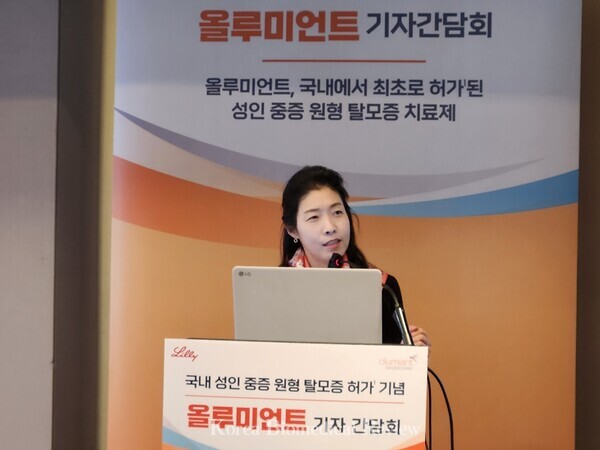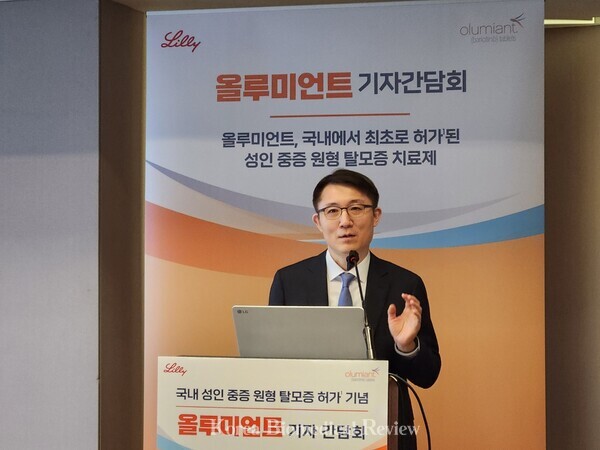Urgent social attention is needed to address alopecia areata as it recurs frequently and can be accompanied by atopic dermatitis and psychiatric disorders, Korean dermatologists said.

At a press conference hosted by Lilly Korea in Seoul on Wednesday, two dermatologists -- Professors Lew Bark-lynn of Dermatology at Kyung Hee University Hospital at Gangdong and Kwon Oh-sang of Seoul National University Hospital -- shared the current status of alopecia areata, disease burden, and the latest treatment advances for severe alopecia areata.
The event aimed to mark the March approval of Olumiant (baricitinib) to treat severe alopecia areata in adults in Korea.
According to Lew, around 170,000 Korean patients received hospital treatment for alopecia areata in 2021, and people aged between 20 and 49 took up 60 percent of the disease burden.
Most individuals with alopecia areata recover spontaneously or respond well to treatment but about 40 percent of the patients experience a recurrence within a year, she noted.
In severe cases, the disease progresses to more extensive hair loss, such as loss of all hair on the scalp, referred to as alopecia totalis, or hair loss over the entire body, known as alopecia universalis, she explained.
Lew pointed out that the disease has a genetic predisposition that is different from balding.
The dermatologist further explained that due to alopecia areata being a chronic autoimmune disease, there is a high probability of co-occurring autoimmune complications, including atopic dermatitis, and a high risk of psychiatric problems. In fact, the lifetime prevalence of psychiatric disorders in patients with severe alopecia areata ranges from 66 to 74 percent, highlighting the need for support for these individuals.

Professor Kwon highlighted how JAK inhibitors like Olumiant suppress the activity of the positive feedback loop between CD8+ NKG2D+ T cells.
Kwon then went on to share the major clinical outcomes of BRAVE-AA 1 and 2 clinical studies which were critical in clinching domestic approval.
“In particular, the Olumiant administration group had a significantly higher rate of achieving the Severity of Alopecia Tool (SALT<20) which translates to roughly more than 80 percent of the scalp covered with hair at week 36 compared to the placebo," he explained.
Regarding the secondary clinical outcome, he noted that the clinician-reported outcome for eyebrow and eyelash, Clin-RO EB/EL, also showed superior hair growth compared to the placebo.
Acknowledging the need for follow-up studies due to the high recurrence rates, Kwon said, "What is noteworthy about the 52-week extension study is that the regrowth of scalp, eyebrow, and eyelash hair continued to improve thus confirming the need for long-term treatment.”
He also showed that the majority of treatment-related adverse events at 52 weeks were mild to moderate with no new safety indications observed with long-term treatment.
“We believe that Olumiant will provide therapeutic benefit to many patients in Korea as a first-line standard of care for adult patients with severe alopecia areata,” Kwon said.
He admitted that the price posed a burden to some patients.
“We hope it can receive reimbursement soon to help as many patients as possible,” he said.

